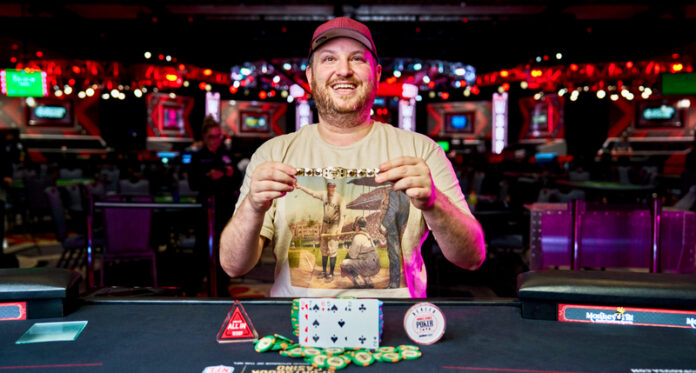Scott Seiver recorded a truly historic victory at the 2024 World Series of Poker on Sunday, June 30. The 39-year-old poker pro based out of Las Vegas took down the prestigious $10,000 no-limit deuce-to-seven single draw lowball championship for his third bracelet of the series and seventh overall. He also earned $411,041 in prize money to bring his career total to more than $26.8 million.
Scott Seiver is just the seventh player in poker history to have won three bracelets in a single year, joining Puggy Pearson (1973), Phil Hellmuth (1993), Ted Forrest (1993), Phil Ivey (2002), Jeffrey Lisandro (2009), and George Danzer (2014). Seiver is the first to have achieved the incredible feat in nearly a decade.
This title run also saw Seiver join an exclusive group of only 11 players who have seven or more career bracelets to their name.

“I mean, I’m on cloud nine right now. I couldn’t be more excited. I thought I would do big things this summer, but I mean obviously you can never dream something like this. But, I think I’m going to get more. I really do,” Seiver told Card Player after coming out on top.
After winning his second bracelet earlier this summer, Seiver said that his impending eligibility for the Poker Hall of Fame (he turns 40 next year) inspired a particular focus on success in this year’s WSOP Player of the Year race.
“It’s always been something in the back of my mind, and as I’ve gotten older and more people I know have gotten in, I realized that a lot of my life I’ve dedicated to this game and this profession, and it would mean a lot to me to show that I’ve left my mark on this field,” said Seiver when asked about those comments. “So, I thought by coming out here this summer and really just reminding people that I am someone that came through poker.”
The highest buy-in no-limit deuce-to-seven single draw event has long been considered one of the most coveted titles by top players in the game. When asked about securing a historic win in this particular tournament, Seiver offered, “It means everything to me. I was really devastated when I got second in this two years ago. I’ve always wanted this bracelet so much. This final table was unbelievably difficult. From two tables down, everyone was tremendous and honestly, that makes it even more special. I am good at this game, but I am not like world-class great. Getting to play with Jason Mercier, Billy Baxter… these are people that have won this tournament 10 times or whatever. It was very special.”
Seiver also secured 840 Card Player Player of the Year points with this win, enough to move him within reach of the top 50 in the 2024 POY standings presented by Global Poker. He also locked up 411 PokerGO Tour points, which were enough to move him into 12th place on the season-long leaderboard. He has also taken over the lead in the aforementioned WSOP POY race, edging out six-time bracelet winner Jeremey Ausmus, who also made the final table of this event.
This tournament drew 186 entries, creating a prize pool of $1,729,800 that was split amongst the top 28 finishers. Essentially every player that cashed would qualify as a big name, with five-time bracelet winner Yuri Dzivielevski (17th), seven-time bracelet winner Billy Baxter (14th), six-time bracelet winner Jason Mercier (9th), and six-time bracelet winner Robert Mizrachi (8th) being just some of the many notables that ran deep.
Aaron Kupin was the first to be knocked out at the official final table, with his pat 10-9 being outdrawn by Ausmus, who drew one to make a 9-8. Kupin was awarded $51,661 as the seventh-place finisher.
Mike Watson, who began the third and final day as the chip leader with nine remaining, ultimately finished sixth for $68,672. The Canadian World Poker Tour champion and two-time European Poker Tour main event winner had his pat jack outrun by the 78-7-6-2 draw of David Lin, who hit a 10 to score the knockout.
Two-time bracelet winner and Poker Hall of Famer Jennifer Harman was the next to fall. She got all-in with a 9-4-3-2 up against a pat 10-7-5-3-2 for Seiver and a pat 10-9-7-6-4 for Jonathan Krela. Harman was unable to improve on the draw and was sent to the rail in fifth place ($93,615).
Harman was soon joined by Ausmus, who check-called all-in after the draw with 10-9-7-4-2. Krela had the best of it with 9-8-4-3-2, which meant Ausmus’ run ended in fourth place ($130,794). This was Ausmus’ sixth final-table finish of the series and 13th overall on the year. He now sits in eighth place in the Card Player Player of the Year race, second in the WSOP standings, and second in the PGT rankings.
Lin got his short stack all-in with 9-8-7-3 leading the 10-7-6-2 of Seiver. Both players paired, but Lin’s pair of nines were higher than Seiver’s sixes. Lin headed home with a career-best score of $187,177 as the third-place finisher.
Heads-up play began with Krela holding 6,500,000 to Seiver’s 4,685,000. It didn’t take long for Seiver to edge his way in front. Krela was able to regain the lead briefly, but Seiver was ahead when the final hand of the tournament was dealt.
Scott Seiver raised on the button to 250,000 and Krela three-bet to 800,000. Seiver called and both players drew one. Krela moved all-in for 4,350,000 with a 10-8-6-4-2 and Seiver thought it over for a while before making the call with a 9-7-6-5-2.
Krela cashed for $274,217 as the runner-up. This was by far the largest tournament payday yet for the Canadian.
Final Table Results
| Place | Player | Country | Prize |
|---|---|---|---|
| 1 | Scott Seiver | United States | $411,041 |
| 2 | Jonathan Krela | Canada | $274,217 |
| 3 | David Lin | United States | $187,177 |
| 4 | Jeremy Ausmus | United States | $130,794 |
| 5 | Jen Harman | United States | $93,615 |
| 6 | Mike Watson | Canada | $68,672 |
| 7 | Aaron Kupin | United States | $51,661 |












